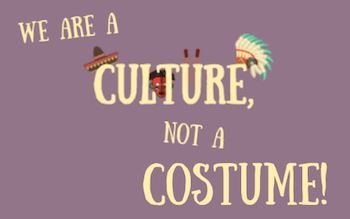Appropriate or Appropriation? Halloween Costume Choices Matter
Fall weather is in the air, and ghosts and goblins will begin to emerge as the calendar turns to late October. UNC students have a longstanding tradition of celebrating Halloween, and the offices of Fraternity & Sorority Life and Student Life & Leadership are helping students avoid cultural appropriation or parody as they start putting costumes together. We Are A Culture, Not A Costume will be held on October 25th from 1pm-3pm in the Carolina Union's West Lounge. The Halloween-themed event will feature information and discussion about cultural appropriation to help students as they consider costume ideas.
"Halloween is a fun time when people of all ages can exhibit their creativity and be whoever they want for the day or night," said Berengére Phillips, Assistant Director of Fraternity & Sorority Life. "However, it can also be a time when cultural appropriation reaches a heightened level and insensitivity toward various identities increases."We Are A Culture, Not A Costume is based on a national campaign that started at Ohio University and has grown to other campuses to help educate college communities, according to Sierra Edwards, a senior Psychology major from Winston-Salem, and student organizer of the event.
"This event has significance to me because the campaign unites many universities to stand against this issue and allows for students to become more culturally competent," Edwards said.
Edwards explained that appropriation may happen unintentionally, but that makes it no less hurtful to others. "Many people are unaware they are misrepresenting a culture because the education on the significance of different people groups are not addressed, Edwards said. "Instead, society has desensitized to this topic which leaves room for racism and a subconscious mindset to perceive one's culture superior. As we are reaching Halloween and all the festivities that happen on Franklin Street, I would hope students can become more conscious of what costumes they are choosing."
Participants will be encouraged to write down thoughts on white boards about cultural appropriation -- where they have seen or experienced it and how it impacts them -- as a way to spark conversation about the topic, and to help people understand how their costume choice might impact others.
"The purpose of the event is to educate students, faculty, and staff about cultural appropriation and to increase awareness as it applies to Halloween costumes," Phillips said. "We are one big Carolina community comprised of an array of cultures that are to be appreciated and celebrated, rather than disrespected and appropriated during not only this Halloween season, but year-round."

